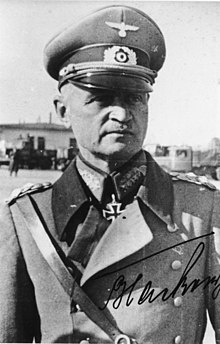Johannes Blaskowitz
| Johannes Albrecht Blaskowitz | |
|---|---|

Johannes Blaskowitz
|
|
| Birth name | Johannes Albrecht Blaskowitz |
| Born |
10 July 1883 Paterswalde, German Empire |
| Died | 5 February 1948 (aged 64) Nuremberg, Allied-occupied Germany |
| Allegiance |
|
| Service/branch | Army |
| Years of service | 1901–45 |
| Rank | Generaloberst |
| Commands held | 8th Army, 9th Army, 1st Army, Army Group G, Army Group H |
| Battles/wars |
World War I World War II |
| Awards | Knight's Cross of the Iron Cross with Oak Leaves and Swords |
World War I
Johannes Albrecht Blaskowitz (10 July 1883 – 5 February 1948) was a German general during World War II and recipient of the Knight's Cross of the Iron Cross with Oak Leaves and Swords.
Commander in Chief in the Occupied Poland in 1939–1940, he had written several memoranda for the German High Command protesting the SS atrocities. He was dismissed, but then re-appointed, no longer calling Nazi policies into question. Charged with war crimes in the High Command Trial at Nuremberg, he committed suicide on 5 February 1948. Both the indictment and the suicide have been considered an enigma by scholars ever since, because he was later acquitted on all counts and had been told to expect to be acquitted by his defense.
Johannes Blaskowitz was born on 10 July 1883 in the village of Paterswalde, (East Prussia), Germany (now Bolshaya Polyana in the Kaliningrad Oblast, Russia). He was the son of a Protestant pastor, Hermann Blaskowitz, and his wife Marie Blaskowitz, née Kuhn. In 1894, Blaskowitz joined cadet school at Köslin (now Koszalin, Poland) and afterwards at Berlin Lichterfelde. In 1901, he started his military career as an officer candidate cadet in an East Prussian regiment in Osterode (Polish: Ostróda).
During World War I, Blaskowitz served on the Eastern and Western Fronts and was employed in the General Staff. He rose to command an infantry company by 1918, and was awarded the Iron Cross for bravery.
Blaskowitz's war service secured him a place in the small postwar Reichswehr during the Weimar Republic, through whose ranks he rose to the rank of General. His attitude towards the Nazis' seizure of power in 1933 was reportedly indifferent because he believed that the armed forces should be "politically neutral".
...
Wikipedia
